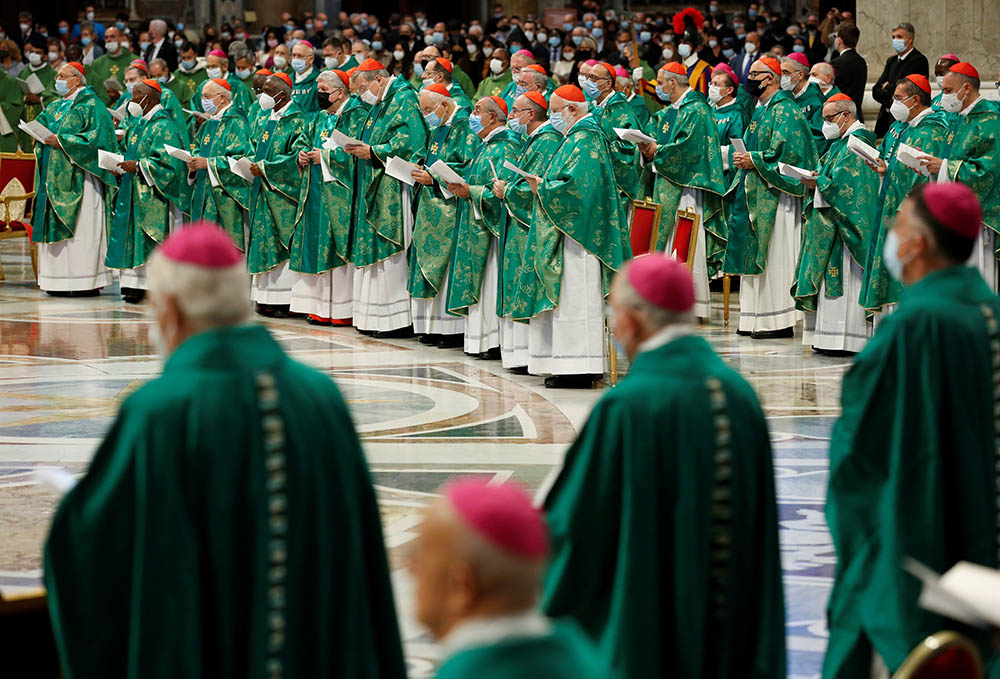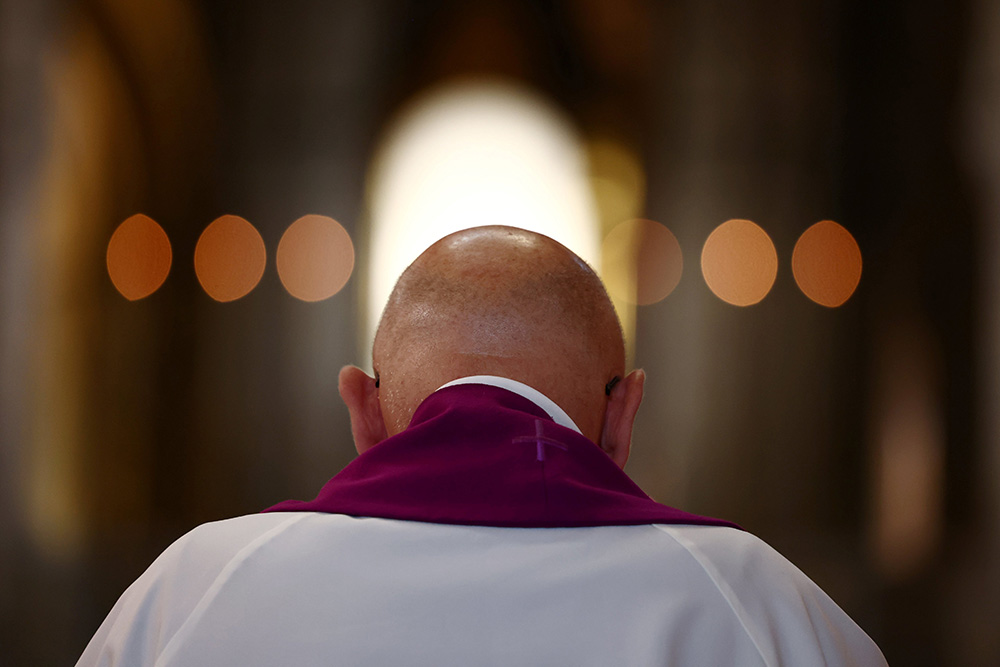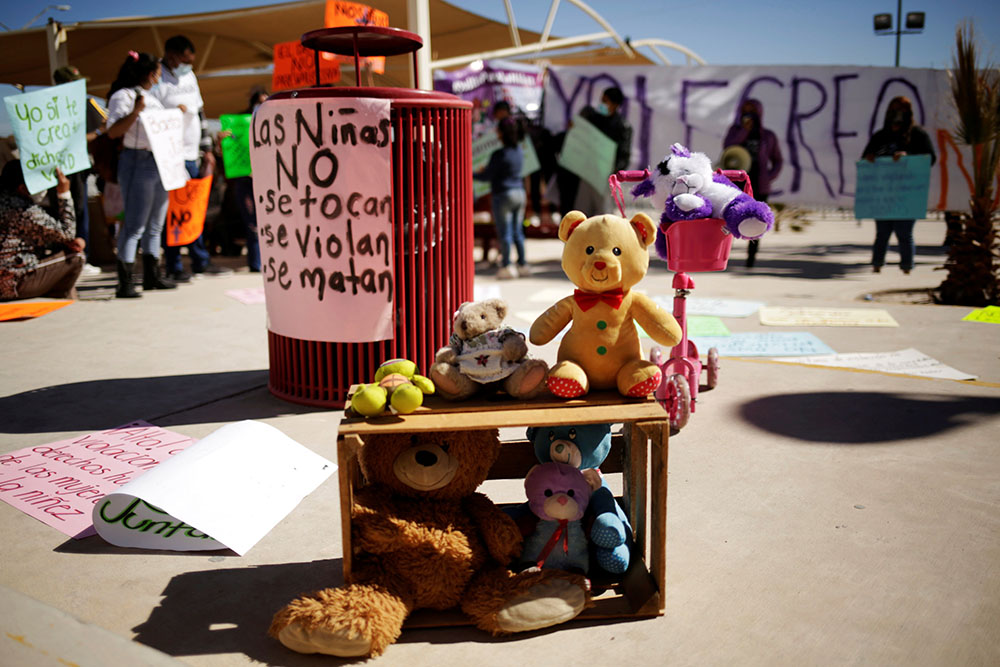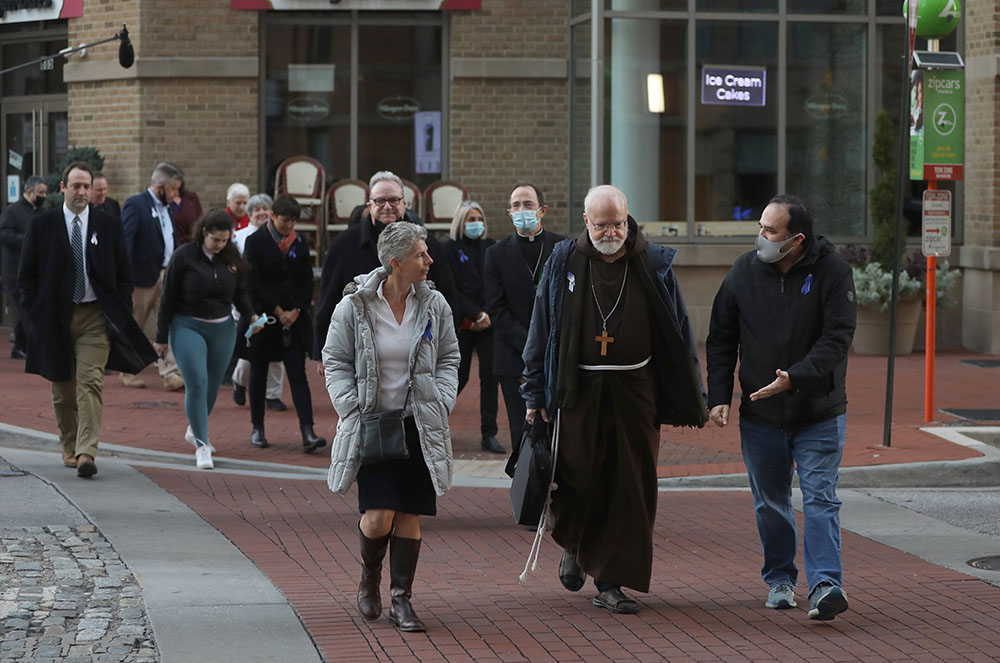
Cardinals and bishops attend Pope Francis' celebration of a Mass to open the process that will lead up to the assembly of the world Synod of Bishops in 2023, in St. Peter's Basilica at the Vatican Oct. 10, 2021. (CNS/Reuters/Remo Casilli)
A 2004 story in The New York Times bore the headline, all in caps: ABUSE SCANDAL HAS BEEN ENDED, TOP BISHOP SAYS.
That top bishop was a young Wilton Gregory who, two years earlier and as head of the U.S. Conference of Catholic Bishops, had herded the rest of the U.S. hierarchy through the first phase of accountability for the scandal.
The headline was based on a Gregory declaration, made following the release of two studies of the scandal. "The terrible history recorded here today is history," he said.
That, of course, turned out to be more wish than reality. The finality implied in the statement has yet eluded the bishops, a point made clear by the recent searing assessment by Barbara Thorp, who took on the job of directing the Boston Archdiocese's response to victims back in 2002, when the ecclesial world there was exploding. She claims that despite the decades of rolling disclosures and revelations that emerged from investigative reporting, grand jury reports, civil cases, the courage of countless victims and grudging reforms resulting in greater transparency, there is still much we don't know.
"The important efforts of these entities and people notwithstanding, they are all limited by the reality that they only know what they know. They don't know what they don't know," she wrote. "The full width and breadth of the story is yet to be told and is held by the archdiocese, dioceses, eparchies and religious orders."
What the young Gregory exemplified in his statements and what Thorp is up against in her plea for "radical truth-telling" on the part of the hierarchy is the culture of hierarchy itself. What cannot be overstated at this point in the nearly 40-year public history of the scandal is the force that the hierarchical culture — that privileged, secretive, unaccountable, male-only construct — can apply against any movement toward radical truth-telling.

A priest prays inside Sacred Heart Basilica in Paris Oct. 6, 2021. A recent report on clergy sexual abuse in the Catholic Church in France shows there have been 3,000 abusers since the 1950s. (CNS/Reuters/Sarah Meyssonnier)
The bishops as a group are sealed off from contemplating such a liberating step by the requirements of membership in the culture. The culture wants the scandal to be stashed-away history.
As a result, bishops seem incapable of confronting the question they should be asking themselves before any other, the question at the heart of the matter: How did we, as a culture of Christian leaders, get to the point where we could turn our backs on the suffering of children to protect the abusers and ourselves?
A parallel concern for laypeople is understanding how we came to accept a bizarre idea of ordination that elevated those wearing the collar to a level of reverence that placed them in an ethereal bubble beyond accountability. We have to acknowledge that our immigrant ancestors wanted our bishops to live as princes, mimicking the wealthiest in the wider society, a sort of collective proof that we had arrived as Americans.
We, too, face a fundamental question: Will we vow never to give any human the degree of authority over our lives as we once did priests and bishops?
A few years ago, a priest friend and I were discussing this matter of culture. He had been a priest at the time for nearly 45 years, had held responsible positions in the national conference and a major archdiocese. Sometime after that conversation, I received an email in which he detailed some of his perceptions of the culture governing the church.
"If you and I were given an outline map of the U.S. and asked to fill in the jurisdictions, we would put in state boundaries and city lines," he explained. "The culture would put in dioceses. If we wanted to know who the leaders in an area, we would consult something like the Congressional directory. The culture would pull out the Annuario Pontificio [the pontifical yearbook].
"Where ordinary people would see the sexual abuse of children as a heinous crime, the culture sees these as sins and failings," he wrote. "The focus of society in such cases would be on the children, but for the clerical culture with no children, the focus is on the priest. Where an ordinary parent would imagine the damage that could be done if this were their own child, the culture has no capacity to even imagine how a parent would feel. Instead, the imagination is self-focused: what would it be like if I were accused?"

Children's toys are seen during a protest to demand justice against a Catholic priest accused of sexually abusing a minor, outside the courts in Ciudad Juárez, Mexico, Feb. 22, 2021. (CNS/Reuters/Jose Luis Gonzalez)
Accountability to civil authorities might be a given for ordinary citizens, but within the culture, he said, "accountability is never imagined as something we owe the people, or the civil authorities, instead we are exempt from that as though we live in some medieval kingdom. We owe accountability only to the bishop and to the Pope."
Certainly, in all that has occurred since the first national story about sex abuse ran in NCR in the summer of 1985, the culture has made some alterations. It has subjected itself to elaborate studies and annual audits, while notably remaining in control of the information going into those efforts. The bishops developed oversight agencies and established review boards at the national and local levels. The Vatican has changed laws and its legal processes to deal more efficiently with not only abusive priests but also with bishops who hide such crimes.
All of that is progress, incremental but essential. All of that, however, is also change forced from the outside. Furthermore, it is the kind of change that any organization might feel compelled to make as a matter of survival. Of greatest significance: It is change, not transformation.
What's missing is what Catholics expect from a sacramental life. The efforts lack any sense of "metanoia," that deep internal transformation of heart that signifies the offender understands the depth and damage of the offense and consequently sees and acts differently.
In the parlance of the scandal, we've benefited from some who "get it." Examples from inside the culture include inactive Dominican priest Tom Doyle; Patrick Wall and the late Richard Sipe, both former Benedictine priests; Fr. James Connell of Wisconsin; the late Bishop Geoffrey Robinson of Australia; Cardinal Sean O'Malley of Boston; and retired Archbishop Diarmuid Martin of Dublin. They are a few of the high-profile actors.
Some of them stayed, some left, but all of them in varying degrees and methods and at different times have acted contrary to the norms of the culture.
We have them to thank for leaps in disclosure, unyielding advocacy for victims and explanations of how the culture works. In conducting reconciliation services, O'Malley and Martin provided some measure of accountability, accepting responsibility and asking forgiveness for the pain and damage to the most vulnerable and their families.

Cardinal Sean O'Malley of Boston, president of the Pontifical Commission for the Protection of Minors, joins a sunrise walk to end abuse Nov. 18, outside the hotel in Baltimore where the fall general assembly of the U.S. Conference of Catholic Bishops was being held Nov. 15-18, 2021. (CNS/Bob Roller)
But even those services demonstrated what was lacking at a deeper level. For O'Malley and Martin were not apologizing or reconciling with their congregations for their personal transgressions. Quite the contrary, each was widely recognized as among the few of their stature who "got it." O'Malley was parachuted into dioceses, the worst of them Boston, to try to repair the damage left behind by others. Martin was one of the rare ones who exhibited unfiltered anger over what he discovered when he took over in Dublin and, rarer still, voluntarily handed over the files he was reviewing to the civil authorities.
Each was taking more incremental steps, standing in for the hierarchical culture that has yet to square up with the full truth of its corruption.
I caught up with Martin in 2011 when he was speaking at a Marquette University Law School conference and told him how unusual it was to hear the clarity and honesty with which he described the scandal.
He looked at me with a kind of disbelief, raised his arms, and repeating a line from his earlier comments, said forcefully, "I was only doing what was right!"
Yes, he was. He was also asking the correct questions. In his remarks during the conference, he said: "The culture of clericalism has to be analyzed and addressed. Were there factors of a clerical culture which somehow facilitated disastrous abusive behavior to continue for so long?" The clarity and the questions were highly unusual at the time and remain so.
Just as O'Malley and Martin were standing in for the hierarchical culture, so was an older and presumably much wiser Gregory when, following his appointment as archbishop of Washington, he met the media for the first time. In that appearance, he repeatedly emphasized that he would be honest.
"I believe that the only way I can serve the local archdiocese is by telling you the truth," he said.
Advertisement
Gregory was not making that statement because he had lied. In fact, it could be argued that he did more than any individual back in 2002 to lead the bishops from decades of denial to the first essential step on the way to making things right. In that year of the Dallas meeting and approval of the Charter for the Protection of Youth and Children, the bishops for the first time corporately acknowledged the problem.
What Gregory was doing in that news conference in D.C. in 2019 was acknowledging that the culture he represented had lied exorbitantly and in a highly destructive way for decades.
He added a telling comment about the culture: "Part of clericalism is circling the wagons so that the episcopacy won't call one another to task. I think this moment has shown the folly of that approach to episcopal governance and episcopal collegiality."
Taking a different approach would require more than changing institutional rules. It would require a deep change of heart that radically alters relationships within the Catholic community.
Thorp is a licensed, independent, clinical social worker and former director of the Pro-Life Office and Office of Pastoral Support and Child Protection in the Boston Archdiocese. She knows what she's talking about. She knows that there is still a great deal we don't know. The scandal has not ended.
We've most recently heard the gasps at revelations of the unthinkable in France. We're told to expect similar soon from Germany. We've only begun to hear of the ugliness still to surface in Asia, Africa and Latin America. It is clear that we'll keep learning more about how the community's trust has been betrayed.
I fully endorse, as do many others who have been digging to get at the truth of this mess for so long, a national database of abusers. It would be another step toward honesty and transparency.
However, disclosure, necessary as it is, does not rise to the level of transformation that Catholics should expect of a sacramental community based on the life of Jesus.
We're still waiting for the hierarchical culture to demonstrate that it actually believes and practices what it has long preached.






